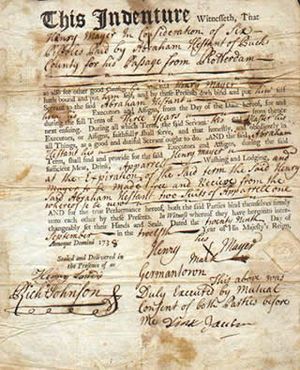Indentured servant facts for kids
An indentured servant was a person who agreed to work for someone else for a certain amount of time. This agreement was like a contract. Usually, these workers, often farmers or skilled craftspeople, would work for three to seven years. In return, their employer would pay for their trip across the ocean, give them food, clothes, a place to live, and other things they needed.
This type of agreement was called an "indenture." It was very common in early America, especially in the 1600s and 1700s, when the country was still a group of colonies.
Contents
Life in Early America
Many people who moved to the American colonies came as indentured servants. Their new employer would pay for their journey across the Atlantic Ocean. Most were young men and women, often under 21, from places like England, Scotland, and Germany. Their parents sometimes made these arrangements for them. In the 1600s and early 1700s, most people arriving in America were indentured servants.
Indentured servants often had to do very hard work on farms or in homes. Sometimes, they were treated almost like enslaved people during their contract time. Sadly, in the 1600s, more than half of these servants died before their contracts ended.
In the 1600s, when a person finished their indenture, they often received a piece of land, usually about 40 acres. However, by the 1690s, it became less common for indentured servants to get land. This led to a protest against the government in Virginia by Nathaniel Bacon and other former indentured servants. This event was called Bacon's Rebellion. After this rebellion, fewer people became indentured servants. Instead, the southern colonies started to rely more on enslaved people for their labor.
This kind of work agreement has appeared in different forms throughout history. Most of the time, people chose to become indentured servants.
Indentured Servitude Today
Modern Examples
Some people say that certain work practices in the United Arab Emirates are like modern-day indentured servitude. Many workers from countries like India and Pakistan have to pay agents in their home countries to get jobs in the Emirates. These agents sometimes take the workers' passports after they arrive. The workers don't know when they will get their passports back. These workers usually receive basic food, housing, and transportation to their workplace.
Laws Against Indenture
The United Nations created the Universal Declaration of Human Rights in 1948. Article 4 of this declaration states that indenture, or forced servitude, is against the law. However, only laws within each country can truly stop it. In America, a law called the Trafficking Victims Protection Act (TVPA) of 2000 made the definition of servitude wider to include more situations.
Images for kids
See also
 In Spanish: Trabajador no abonado para niños
In Spanish: Trabajador no abonado para niños
 | May Edward Chinn |
 | Rebecca Cole |
 | Alexa Canady |
 | Dorothy Lavinia Brown |



